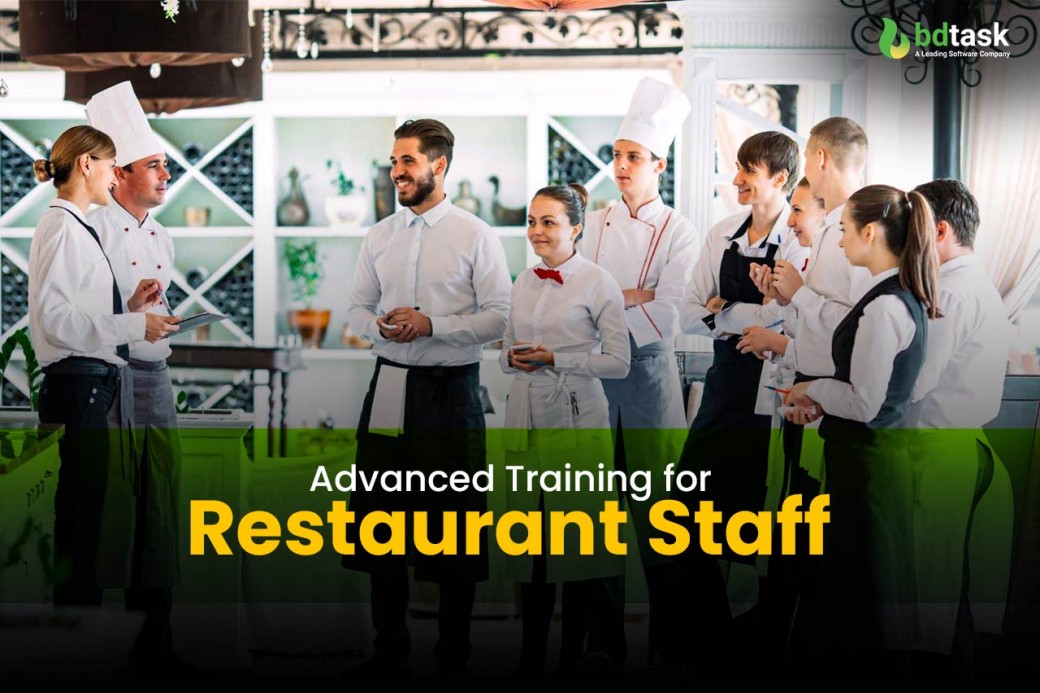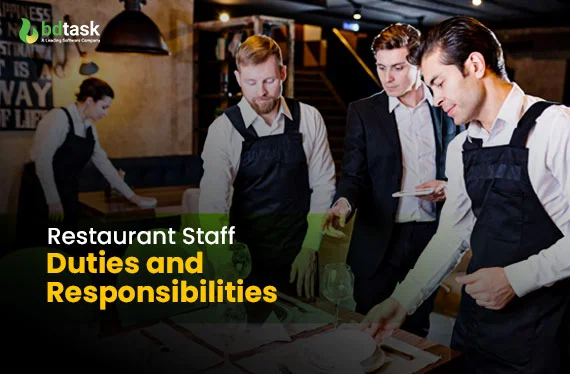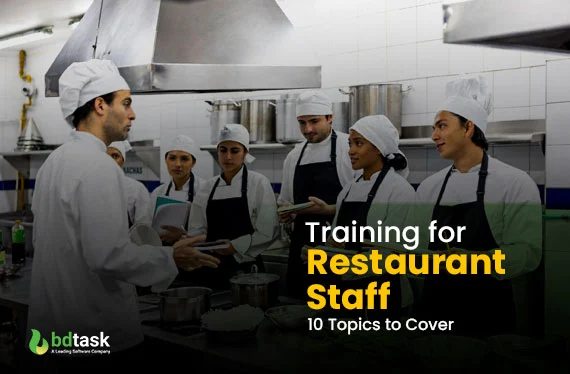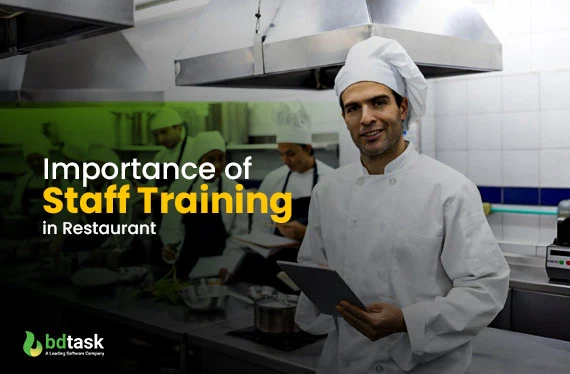Advanced Training for Restaurant Staff to Increase Sales

The restaurant business is one of the most challenging and demanding businesses right now. It takes a lot of hard work and strategies to run a successful restaurant business. Hiring and training restaurant staff is one of those strategies. Restaurant staff is considered the most effective part of any restaurant business. They are the ones who run the restaurant. So, it is crucial to know how to recruit restaurant staff or arrange basic training for restaurant staff. Moreover, as a restaurant owner, you must know which method of training do most restaurants use.
Restaurant Staff Duties and Responsibilities

Do you have any relation to the restaurant business? If so, then you must know about restaurant staff duties and responsibilities. We can call this a restaurant staff job description. It is impossible to run a restaurant without staff, and different staff have different responsibilities.
Here, we will discuss the restaurant staff positions list along with the restaurant staff duties and responsibilities.
Front House Staff
Host
- Welcome And Guide For Seat
- Answer Phone Calls
- Take And Manage Reservation
- Provide Menus And Guideline
Server
- Take Order And Send Them To The Kitchen
- Serve Food To Customers
- Handle Customers Requirements
- Maintain Service And Payments
Busser
- Clean Tables After Service
- Rearrange Table For New Guest
- Manage Cleanness On Service And Dining Area
- Assist In Managing Inventory
Back House Staff
Head Chef
- Supervise Kitchen Operations
- Develop Menus And Food Recipes
- Ensure Food Quality
- Maintain Inventory
Sous Chef
- Assist Head Chef In Kitchen
- Supervise Kitchen Activity
- Maintain Food Quality And Consistency
- Assist In Menu And Inventory Management
Line Cook
- Prepare Specific Dishes
- Ensure Recipes And Food Presentation Standards
- Maintain Cooking Station
- Assist In Stocking And Preparing Ingredients
Dishwasher
- Wash Dishes, Glassware And Other Utensils
- Assist In Cleaning Kitchen And Other Areas
- Ensure Utensils Are Stored Properly
- Assist In Waste Removal And Cleaning Tasks
Management Staff
General Manager
- Supervise Everyday Operations
- Manage Restaurant Staff
- Ensure Guest Satisfaction
- Handle Administration Sectors
- Monitor Financial Budgets
Assistant Manager
- Support General Manager Regularly
- Train And Supervise Restaurant Staff
- Handle Customer Issues
- Manage Inventory
- Ensure Restaurant Policies
Training for Restaurant Staff: 10 Topics to Cover

Training for restaurant staff is important. Restaurant management involves multiple responsibilities. So, as a restaurant owner or restaurant business entrepreneur, you have to know how to train restaurant staff and arrange training sessions for restaurant staff. Remember one thing: the more effectively you can train your restaurant staff, the more successful you will become in your restaurant business.
Here, we have listed ten essential topics that you should cover while hiring restaurant employees and arranging training for your restaurant staff.
1. Excellent Customers Service
Any business you run must provide excellent customer service. It is the most important task that makes any restaurant successful. Excellent customer service is the best way to increase customer loyalty, draw new customers and keep old customers coming back.
There are some stages of Excellent customer service training.
- Explain the importance of guest satisfaction for any restaurant.
- Effective way of welcoming guests and interacting with customers.
- Smoothly handle different types of complaints and manage hard situations.
2. Food Safety and Health Standard
Food safety is not just a part of restaurant staff training; it's a fundamental aspect that should be a top priority. As we all know, people visit our restaurant to savor a variety of dishes, and it's our collective responsibility to ensure that we provide them with excellent food by adhering to proper food safety rules. Maintaining food safety and health standards in every sector of the restaurant is not just a task but a commitment we all share.
Here are the key stages of food safety and health standards that form the core of our restaurant staff management training. Let's recommit ourselves to this important task.
- Hygiene and Food safety practices everywhere.
- Maintain proper sanitation and handwashing procedures.
- Provide enough knowledge to prevent cross-contamination.
3. Order Management
Order management is a crucial part of restaurant staff training. If the staff can properly manage orders, they will retain customers. So, the restaurant owner or management should ensure that the restaurant has an effective order management system and is accurately run by the restaurant staff.
Here are some steps of the training module for restaurant staff order management.
- Efficient table management and order-taking strategy.
- Ability to handle any special request.
- Provide serving food according to order taken.
4. Food Handling and Storage
Good food comes from good ingredients. In that case, we have to store and handle food by maintaining proper guidelines. Different food storage methods have different rules and temperatures. On the other hand, food handling is related to ensuring that the food your restaurant is providing is safe and that all the nutrition is equally integrated.
Here are some steps of a food handling and storage training plan for restaurant staff.
- Properly maintain storage equipment, labeling, food organization, and temperature management.
- We must train our staff about food spoilage and foodborne health hazards.
- Educate about legal lawsuits and business consequences from unhealthy and unsafe food supply.
5. Menu Management Knowledge
A good menu is a reflection of a good restaurant. Therefore, before launching a restaurant, the business owner must focus on creating a detailed menu, free from any hidden costs. Equally important is ensuring that the restaurant staff are well-versed in the menu. Their detailed knowledge will enable them to guide customers through their dining experience effectively.
Here are some key topics that should be covered in menu management training.
- Complete knowledge of the menu, including food ingredients, preparation methods, etc.
- Details understanding of dietary and allergy awareness.
- Offering seasonal special and daily special dishes.
6. Cleaning and Maintenance
A restaurant is a place where different types of people come, sit, eat and spend their time. So the place should be very organized and clean. Restaurant staff should keep an eye on their restaurant to maintain proper hygiene and cleanliness.
If the restaurant is not able to maintain proper hygiene, the customers will never come to the restaurant again, and they will give a negative review of your restaurant. So it is a must to train your staff how to clean and sanitize the restaurant.
Here are some topics that should be focused on as a part of cleaning and maintenance training.
- Proper use of cleaning equipment and supplies.
- Maintain cleaning schedules on a regular basis.
- How to recycle and manage waste.
7. Effective Communication
Effective communication among the restaurant staff is an important part of any restaurant management. Only then will the restaurant be famous and successful. A restaurant has many staff members, such as hosts, managers, salespersons, cooks, cashiers, etc. The restaurant should ensure all the staff are effectively communicating and providing the best dining services to the guests.
Here is a list of some topics that should be covered as a part of an effective training program for restaurant staff communications.
- Properly maintain professional and clear communication with the customers.
- Strong communication skills with the restaurant kitchen staff.
- Ability to handle different types of reservations and manage phone calls.
8. Sales Technique
Different restaurants use different sales techniques. It plays a major part in the restaurant business. With a proper sales strategy, restaurants can increase their sales. So, the restaurant owner has to ensure all the staff of his restaurant are well trained and aware of different types of sales techniques to increase sales and make more profits.
Here is a list of some sales strategies that should be included in your restaurant training program template.
- Properly knowledgeable about improving guest experience.
- Promote different types of special offers and engage in high-margin items.
- Use suggestive and upselling techniques.
9. Restaurant Opening and Closing
A restaurant opening and closing is not just like your home door opening and closing. It has a very complex scenario. When any staff member opens and closes the restaurant, they have to follow some rules, and they have some additional duties before doing so. Actually, closing the door means you have all the settings for the next day.
Here are some tasks that should be included in the restaurant opening and closing training.
- Check all the transitions and make daily sales reports.
- Ensure all the lights, fans, ovens, and gas stoves are turned off.
- The restaurant is clean enough, and all the furniture is well organized and ready for tomorrow.
10. POS Integration and Workplace Safety
Nowadays, most of the restaurants have updated their restaurant management system. They follow the trend to cope with the situation and try to be successful in the restaurant business. Now, most restaurants use the restaurant POS system for transactions and other management work. Using the pos system eliminates human tasks and reduces errors in the restaurant business.
On the other hand, workplace safety is most important for the restaurant staff. In the workplace, the staff has to face many tasks, and they get involved in fire, knives, and so much other equipment. It creates a high risk of any accident. The restaurant staff had enough training to do the task safely.
Here, the task should be included in the POS integration and workplace safety training.
- Proper use of the POS system, restaurant staff scheduling software and many different types of transactions process.
- how to safely use the knife, electric oven, and fire.
- Proper use of a first aid box.
- Knowledgeable about emergency exits and many more.
Importance of Staff Training in Restaurant

Restaurant staff training is important for multiple reasons, and all directly contribute to the restaurant's success and to establishing the reputation of the business.
Here, we briefly describe the importance of restaurant staff training.
1. Stability in the Quality of the Services
- Standardized Practices: Restaurant staff training ensures that every member of the staff follows the precise protocols, resulting in consistently high-quality service regardless of employment status.
- Customer Experience: Higher customer satisfaction and repeat business result from consistent, excellent service that enhances the entire eating experience for restaurants.
2. Enhanced Productivity and Efficiency
- Streamlined Operations: Restaurant staff who have received the necessary training can carry out their responsibilities quickly and accurately, which minimizes mistakes and delays. Especially during busy hours, which is crucial for the restaurant business.
- Time Management: When the staff is well trained, they can manage their working time better by balancing tasks, such as order taking, serving, and cleaning. They can handle it without compromising the service quality.
3. Enrich Guest Satisfaction
- Well Educated Staff: When the restaurant staff is well-trained, they can frequently answer all the customer queries about the menu, suggest different types of recommendations, and smartly handle special requests.
- Better Problem-Solving: Well-trained staff have a better ability to handle different types of complaints or issues that the restaurant faces, quickly solve the situation, and make the customers happy.
4. Increased Overall Sales and Profitability
- Upselling Techniques: Training in sales techniques can help restaurant employees suggest selling higher-margin items, which motivates the restaurant staff to increase overall sales and profits.
- Effective Use of Resources: Well-trained restaurant staff are less likely to waste food or beverages. It leads to cost savings and higher profit margins.
5. Observance of Health and Safety Laws
- Food Safety: In order to lower the risk of foodborne illnesses, proper staff training makes sure that all employees are aware of and abide by food safety and hygiene regulations.
- Legal Compliance: The restaurant can avoid fines and legal problems by adhering to local rules and regulations through training in areas such as emergency protocols, allergen awareness, and alcohol service.
6. Decrease Staff Turnover
- Job Satisfaction: Well-trained restaurant staff are more confident in their duties, which leads to higher job satisfaction and reduced employee turnover.
- Career Development: Providing employee training opportunities shows that the restaurant values its employees and increases loyalty and retention.
7. Positive Work Environment
- Teamwork and Communication: Restaurant staff training helps to promote strong communication and ensure smooth teamwork. It leads to a more positive and synchronized work environment.
- Conflict Resolution: Staff who are trained in contest resolution can handle struggling situations more effectively, and it helps to reduce tension and maintain a balanced workplace.
8. Adaptability to Change
- New Technologies and Trends: Persistent training helps the staff to stay updated with the technologies, innovations, and industry trends. It helps to modify the menu and service style.
- Flexibility: Trained restaurant staff are more flexible and can smoothly handle any changes or challenges with greater satisfaction. It ensures smooth operations even in unexpected situations.
9. Enhanced Reputation
- Word of Mouth: A well-trained restaurant staff can smartly deliver a remarkable dining experience. It leads to positive word-of-mouth and reviews that can attract new customers.
- Brand Image: High-quality and consistent food service builds a strong brand image that sets the restaurant apart from competitors.
10. Employee Safety
- Workplace Safety: Training in the proper use of equipment and different types of emergency procedures helps to prevent unwanted accidents.
Final Thought
A restaurant is not only a business. It also represents your brand, And the staff of your restaurant are the brand ambassadors. There are also some restaurant staff hiring agency where you will find highly trained restaurant staff. Train your restaurant staff in that way so that they can bring your business to the next level. Restaurant staff should focus on quality and quick service, and as a result, customers will give positive feedback. So, as a restaurant owner, you must ensure that you have arranged an organized training program.
Also Read:










